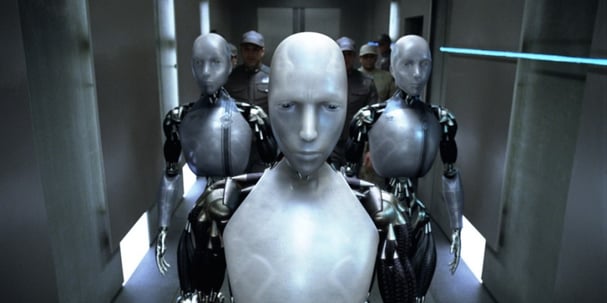By Mr. Roberto Lorenzoni
Humans have been fascinated by robots for a long time. Robots show intelligent behavior, are resourceful, and can work ceaselessly. Science fiction movies have brought robots to life, and although movie scenarios are exaggerated, robots will play an integral part to our future. Most of the time Robots serve humans and interact with them empathetically, while other times, they are aggressive towards humans and have a mission to conquer, enslave, or exterminate the human race. Generally we believe that Robots will be beneficial to our advancement and that humans will control machines and use them for good. However, some people feel that machines could take over our lives, take jobs away from the work force, and outcompete humans. Therefore, it is important that we start deliberating on social, ethical and legal issues, as well as the role machines will play in our lives.
Opening a dialog on how machines can be introduced smoothly into our daily lives is crucial, especially now, as Technology and Artificial Intelligence (AI) continue to develop at a fast pace. The European Parliament categorizes AI as “Electronic Persons”[1], and believes that they will resemble people and even probably surpass human intellectual capacity soon. This leaves us with a crucial question. Who will be in control?

This story was first told by Karel Čapek in, Rossum’s Universal Robots (R.U.R.) a play which premiered on January 25 1921[2]. The word robot was created by Karel Čapek’s brother, the artist Josef Čapek, from the Czech word robota meaning 'forced labour'. The play tells the story of humanlike biological beings created with the purpose to replace human labor. As time passes, these robots take over all jobs, and human beings devolve to a state of uselessness and become unable to contribute positively to society. Ultimately, the robots get tired of being forced to work for humans, and decide to exterminate the useless existences that humans have become, with the exception of one human who is still capable of labor. The only reason he was left alive is so that he can create more robots. However, the robot formula was destroyed by the inventor of the robots shortly after their conception, and the last human does not succeed in reproducing the formula. In the final twist of the story, two of the robots fall in love and live happily together, leaving the audience with the impression that they will reproduce and become the foundation for a new civilization.[3][4]
To protect humans from the same fate as those in Karel Čapek’s play, Isaac Asimov has created “The Three Laws of Robotics” in his 1942 short story "Runaround"[5].
1. A robot may not injure a human being or, through inaction, allow a human being to come to harm.
2. A robot must obey the orders given it by human beings except where such orders would conflict with the First Law.
3. A robot must protect its own existence as long as such protection does not conflict with the First or Second Laws.
These laws will make certain that we can avoid an extreme situation such as the one explored in Karel Čapek’s R.U.R play. However, more importantly, there are still many questions that remain on how humans should interact with electronic persons in a productive, safe, and ethical way. The European Parliament has opened the dialog on “Civil Law Rules on Robotics”. The draft report[1] issued on May 31, 2016 by Ms. Mady Delvaux Vice-Chair of the Committee on Legal offers a series of recommendation to prepare the EU to deal with the increasing presence of automation and artificial intelligence.
The report warns on possible legal, social and ethical challenges that could have considerable impact on human life by raising concerns about the future of employment and the practicality of the current social security and taxation system, which could result in a further increase of inequality in the distribution of wealth and influence. Furthermore, the draft report states, “there is a possibility that within the space of a few decades AI could surpass human intellectual capacity in a manner which, if not prepared for, could pose a challenge to humanity's capacity to control its own creation and, consequently, perhaps also to its capacity to be in charge of its own destiny and to ensure the survival of the species”.
The proposal outlines a series of recommendations covering the introduction of an EU-wide Electronic Persons or advanced robots registration system controlled by an EU authority. These recommendations include establishing laws that hold machines liable for damage they cause, as well as formulating an ethical code of conduct to regulate design, development, and interaction between humans and robots with a special emphasis on human safety, privacy, integrity, dignity, autonomy and data ownership. The proposal also emphasizes the need for machines to pay social security contributions to off-set the reduced contribution by human workers, and to have compulsory liability insurance coverage.
Robots are being deployed in ever-greater numbers in factories and are also taking on tasks such as personal care or surgery, raising fears over unemployment, wealth inequality and alienation. Some people define it as the rise of a new industrial revolution. The reality is that robots are here to stay and we have to learn to coexist. Like the EU, other nations are starting similar dialogs. These deliberations are crucial to enable us humans to reap the best of the human-machine relation. Experts will be needed to monitor safety, privacy, integrity, dignity, autonomy, and data ownership. I am sure that TÜV Rheinland can be an important player in this arena.
[1] DRAFT REPORT - with recommendations to the Commission on Civil Law Rules on Robotics (2015/2103(INL)) - http://www.europarl.europa.eu/sides/getDoc.do?pubRef=-//EP//NONSGML%2BCOMPARL%2BPE-582.443%2B01%2BDOC%2BPDF%2BV0//EN
[2] Wikipedia - https://en.wikipedia.org/wiki/R.U.R.
[3] https://interestingliterature.com/2016/03/14/the-curious-origin-of-the-word-robot/
[4] http://www.todayifoundout.com/index.php/2012/05/where-does-the-word-robot-come-from/



